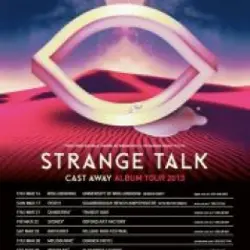 Strange Talk
Strange TalkAmongst the plethora of faceless electro-pop outfits in 2013, only occasionally does one emerge from the heap in the minds of Aussie music consumers. For better or worse, triple j Unearthed has offered numerous groups an opportunity to vie for repeated radio play or a coveted slot at any number of the umpteen festivals this country has. The inception of Melbourne's Strange Talk is no different, really, to that of any number of Australian acts – the difference for them is what they chose to do with each and every opportunity slung their way, all while providing a string of clever pop singles destined for high rotation.
Their rise to the top of the electro-pop mountain might seem to have bounced out of nowhere, but like any hard-working and well-oiled machine, the four-piece have endured quite the journey so far. There was, of course, the triple j Unearthed win back in 2010, but unlike many, their astronomic rise was lauded thanks to a distinctly camp but undoubtedly infectious crisp and danceable sound; one that landed their single Climbing Walls atop the US Billboard Uncharted Chart and licensed to everything from 90210 to Need For Speed computer games and much more. Now with a debut album – Cast Away – under their belts, vocalist Stephen Docker and bassist Gerard Sidhu are determined to be just another faceless band on the radio.
“The recognition seems to be really starting to sink in,” explains Docker thoughtfully. “I think that's how it happens for a lot of acts, especially when you build from the organic process. A lot of people don't necessarily know the name of your band but they've probably heard a number of songs thousands of times. Hopefully now we've got a body of work out, I'm sure it will give a few more legs to the project and we'll get more recognised as a band, rather than by a song by song basis. But it feels good to have something out finally because, as artists, you see it form from the ground up. For us, at least, it feels like a lifetime ago from when we finished the demos to when it got mixed and mastered and now, a few months later, it's finally out.”
Formed in early 2010 by Sidhu and Docker, Strange Talk are an oddball assembly of characters from various backgrounds – there's a classically trained violinist, a dance producer with a DJ background and two musicians from the funk/soul world. “For Gerard and I, we met when we were 18 or 19 in clubs around Melbourne,” Docker reveals. “He was a DJ around the place and I was the annoying punter who would request the same track every week and we ended up chatting one night and Gerard needed a violinist so I came into the studio and [we] wrote some stuff together. We got over the whole dance thing and wanted to write songs so we taught ourselves to do that and after a couple of years we started up Strange Talk and wrote the first handful of songs. We started to get a lot of attention from management companies and labels all asking for showcases, but we didn't even know what a showcase was.
Don't miss a beat with our FREE daily newsletter
“Eventually we were referred to Gillan [Gregory, guitar] and Trav [Constable, drums], two guys from that funk/soul background that really shows on stage. They've really changed what we do from a live aspect, we try and change what we do on stage – muck around and change up structures and have little jam sessions up there, just to try and differentiate between the recordings and live. No one wants to go to a show and hear the CD… It creates a lot more motivation for us and helps us not get too bored.”
There is some serious songwriting on Cast Away. Sure, the singles have all landed on rotation due to each one being cram-packed full of hooks, but spin the record and you'll hear varying moods and meaningful lyrics that transcend disposability immediately – something not always conducive to dance music. “You basically write a lot of bad songs and then slowly they start to get okay and then eventually good,” Sidhu laughs. “We look back on the stuff we wrote two years ago and it's horrible but we learnt a lot of what not to do. Also, we listen to a lot of music and dissect it – arrangements, melodies and so on.”
“We take a lot of care in melody,” Docker interjects. “At the end of the day, a melody is something someone is going to remember and want to sing. We're all about hooks and if you have a really great song that is interesting on its own and you can add some interesting instrumental, it's just going to heighten it. We try to write real songs, yes; but in one instance, Morning Sun, we did try to take it down the loop-based, dance path. When we were clubbing, it was all about the Daft Punk loop-based songs. But we really wanted the album to reflect every piece of music or everything that we've grown up with, whether it be Michael Jackson or Queen or all those loopy-based dance tunes. We tried to throw it into a big blender and see what comes out.”
By now, it's pretty clear that Strange Talk don't want to be crammed into any one box and have aimed to defeat expectations on their debut album. Their lyrics flip between character-based (Wanted (Dead Or Alive)) and the autobiographical (Falling In Love, Take Me As I Am) while their influences, rooted in the dance world, are often challenged by the occasional inclusion of something odd that strangely works – like an '80s hair metal guitar solo in a ballad called Come Back Home, for example. “We really try and push our personal envelope as much as possible,” Docker explains. “I think, for us, doing a ballad will be something no one will expect but we like to show another side to what we can achieve. That song was a time I was going through a pretty rough break up and we actually kept the original demo vocals as I had so much backed up emotion to spill.”
Now that the album is out, Strange Talk are playing shows all over the country and are about to relaunch their assault over international waters. “I think there will be definitely a lot of hype and a lot of attraction [to] our stuff over in the US and come mid-this year, we'll be getting over there and doing a hell of a lot of touring,” Docker contemplates. “Being a debut record, we don't know how to feel about it, we've lived with it for so long – all the reviews have been really encouraging so far. You certainly can't please everyone, I am sure there will be some negativity. The best advice we've had is don't read your reviews and just remember what you already know.”
















